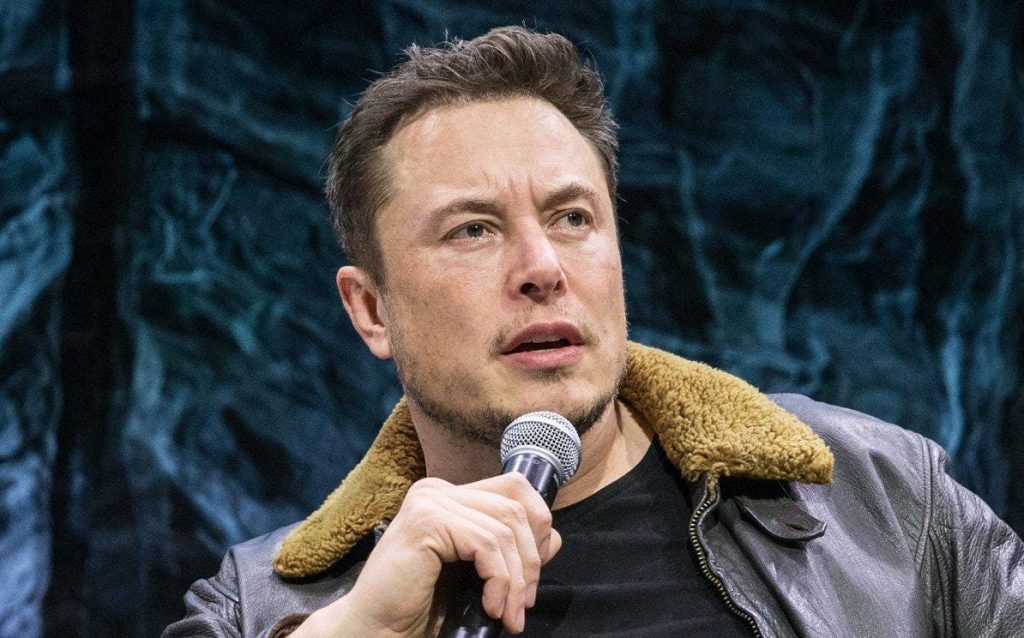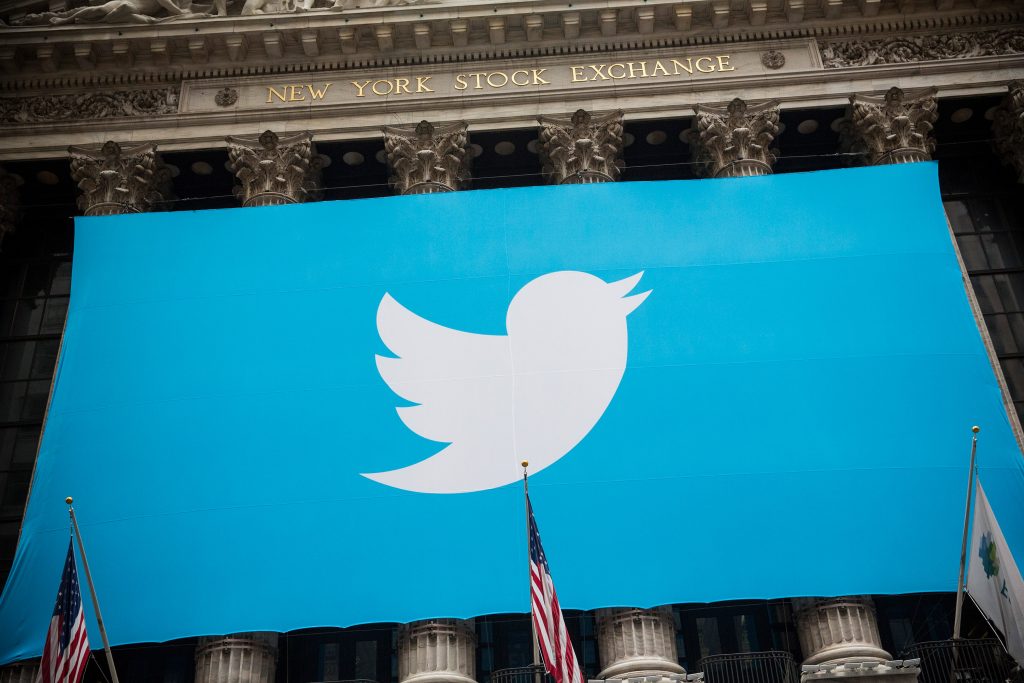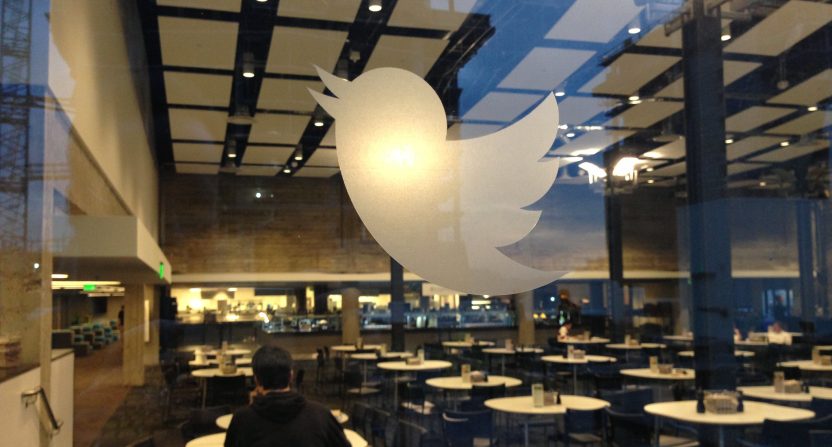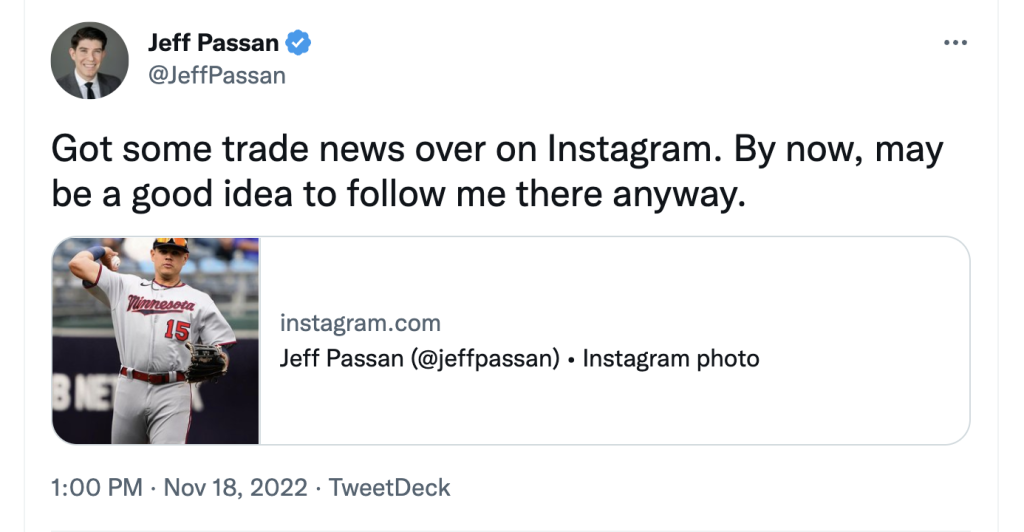A little over six months ago, Elon Musk finalized his $44 billion deal to buy Twitter. Since then, the former richest person in the world has firebombed his reputation and seemingly accelerated the social media platform’s demise with a series of short-sighted decisions that have eroded Twitter’s trust, value, and revenue.
Back in November, we spoke to a collection of sports media members to gauge their feelings about what Twitter means to them, what their concerns might be around Elon’s tinkering, and what the sports media landscape might look like without the social media platform. Now that we have six months’ worth of data to look at, we wanted to speak with sports media folks once more to see how different those sentiments might be in a post-verified world.
This time around, Awful Announcing spoke with ESPN’s David Hale, CBS Sports Radio host Amy Lawrence, Sports Illustrated’s & SEC Network’s Richard Johnson, NFL analyst and media personality Lindsey Ok, AL.com sports editor Andrew Hammond, Syracuse.com’s Brent Axe, and Extra Points newsletter publisher Matt Brown.
As the only member of the panel that we spoke with last time, Hale offered us a chance to compare the sentiment from the early Elon ownership days to now. In November, he said, “I think the most likely outcome is that Twitter becomes more about communities — engaging with the people whom you find valuable and blocking/muting the ones you don’t — than it might’ve been before.”
But what about now?
“I figured when Elon Musk took over, he was likely to make a lot of things worse, but I also hoped he’d make a few things better — injecting some much-needed innovation into the platform,” said Hale. “That’s one of the reasons I thought the idea of “communities” could be something that developed, with Twitter adapting to demand from its audience akin to Facebook Groups. Circles actually seemed like a step toward that, but it’s gotten no legs, mostly because the bad Elon stuff has so badly outweighed the… OK, maybe there hasn’t been any actual good stuff. I’ve largely followed my own advice here though, and I’ve opted out of viewing the stuff I don’t like, my list of follows has probably gotten smaller, and for the most part, my feed looks the same as it always has.”
Not everyone shared that hopefulness when Elon took over, as many of the others we spoke with had hoped for the best while expecting the worst.
“I didn’t think the thing would go bust overnight, but I did think it would do just about what’s happened: intermittent flickers of outages and glitches that show there is little to nobody at the wheel on a daily basis,” said Johnson. “That seems like it’s about where we’re at now.”
“When Elon bought Twitter (as a joke) we all knew he wasn’t serious and he’s shown he’s not serious for one second,” said Hammond. “My expectation is kind of where things are at now, a complete mess. He’s basically Cousin Greg from Succession if you actually gave him the keys to the kingdom, no actual ‘how-to’ guides, and made him an even worse person.”

Musk
“I was certainly intrigued,” said Axe. “Love or hate Elon Musk, the guy is considered one of the most innovative minds on the planet. Now? I feel sad that he’s basically just another troll on his own platform.”
“I honestly didn’t know what to expect, because Elon says all sorts of things and then doesn’t actually do them,” said Brown. “I sort of figured he wouldn’t actually buy the service right up until he walked into the office for the first day. You could have told me just about anything, from a meltdown even worse than what’s already happened to Twitter actually getting better, and I would have believed it. Now, of course, I have absolutely no confidence that any of this is going to improve… because the guy fundamentally doesn’t understand what he bought, and he hates the people (journalists, weird Twitter posters, and brands) that actually make the dang thing run.”
Taking a step back, it’s worth noting Twitter’s importance to many people in the sports media as they were building their careers, and why its potential end feels so frustrating or disappointing.
“Twitter is essentially the reason I was able to take this full-time,” said Ok. “It’s the easiest way to get your thoughts out there – and the best part for me is live-tweeting during games/up-to-the-minute updates. I got my start in sports media tweeting about football and I’m here because of it.”
“Twitter has been invaluable as a broadcaster and journalist because news BREAKS there,” said Lawrence. “The site is always open while I’m on the air, and my producer and I pull audio clips from other accounts to use as talking points or conversation starters. Being on Twitter also offers a wealth of connections with fellow broadcasters and members of the sports media.”
“I can’t overstate how important it’s been,” said Brown. “I didn’t go to an elite journalism school (or shoot, any journalism school), and fell into sports media by accident via SB Nation. I didn’t have access to the traditional pathways of getting bylines, building sources, and gaining an audience…Twitter helped me do that. Until very recently, I’d DM sources about as often as I’d text or email them, and prior to Elon, Twitter was the No. 1 referral source I had for new newsletter subscribers. I would not have a career without it. Of course, it also ruined my brain and sent me to therapy, but hey, occupational hazard of the business, right?”
“I don’t think Twitter is how I got ‘discovered’ but I do think it’s how I discovered multiple things that shaped me professionally,” said Johnson. “I found a community of college football creators who treated the sport with an irreverence I immediately gravitated to. Eventually, I got to work with many of those people in my days at SB Nation and I wouldn’t have traded that for anything in the world. There is value in how the service amplified new voices in its early days and it opened me up to a brand new world of football analytics — for better and for worse — as well as scheme Twitter in many of the coaches that I follow. I can’t sit here and say I’m the journalist I am today without.”
“Twitter has been everything for my career. From opportunities as a blogger to podcasts to actual jobs,” said Hammond. “I mean, I can’t tell you how many people have the same story. It’s truly been a life-changing app, crazy enough.”

Unfortunately, a lot of what made Twitter feel valuable or essential to the sports media process has been going away over the last six months as satire has died, several news organizations have left the platform, and far-right accounts have surged. Many people have had to change their relationship with Twitter and that absolutely includes some sports media members.
“I am undoubtedly spending less time on my main Twitterfeed,” said Johnson. “Some of that is natural because the offseason allows me to unplug to an extent, but some of that is forced on my end and perhaps it has some to do with the degradation of the service. Mostly I think it has to do with just being bummed out by the combo of doom-scrolling, performative hot takes, or the main character pile-on type stuff.”
“Twitter was never very good at drawing raw traffic, as most other sportswriters would tell you, but it could be very good at brand and audience-building,” said Brown. “For the first two and a half years of Extra Points, our #1 source of new subscribers was Twitter, and for many months, it wasn’t close. That pipeline has almost completely dried up over the last few months. I still have to use Twitter as a tool for engaging with my existing audience and existing source network, but I’ve had to spend more money and more time on creating other audience development engines… engines that right now, don’t work as well as Twitter.
“The thing that really set off alarm bells was how Twitter, if only for a little while, started nuking the reach for Substack posts. Today it’s Substack, tomorrow it’s Beehiiv because somebody there said something mean about Catturd2 or whatever, and maybe in a few months, it’s LinkedIn or Spotify or something else. That unpredictability and capriciousness of the platform and its ruler make it almost impossible to trust it as a valuable business tool.”
For some, the changes on Twitter haven’t been as stark and have amounted more to tweaks in the experience.
“It hasn’t changed much, but I have noticed that people that you’re used to interacting with either are not on as much, or they’re harder to find on Twitter,” said Hammond. “But there’s been a change in the ‘Twitter atmosphere for sure’.”
“I may have distanced myself from it a bit — or that might just be because it’s a slower time for college sports,” said Hale. “During the NCAA basketball tournaments, for example, I was still pretty glued to Twitter to keep tabs on what was happening across the country and gauge reactions in real time. The “taunting” in the LSU-Iowa women’s game actually felt much like old Twitter — overreactions, overreactions to those reactions, funny gifs, and a bunch of people either yelling at no one or patting themselves on the back for being smarter than everyone else. It felt like home.”
One of the biggest issues to hit Twitter during Elon’s reign has been the change to the verification process, which stopped acting as a way to confirm who was who and turned it into a status symbol for people you don’t want to associate with (it appears Elon has since realized his mistake even if he won’t fix it). That’s impacted sports media members in various ways.
“The most obvious part for me was the loss of my verification – my tweets aren’t seen by as many people as they used to,” said Ok. “I have also had a long-time problem of people creating fake accounts of me or using my photos on their accounts. Now, that is easier to do (and has happened twice so far – once someone making an account to tweet horrible things, and once to promote a porn site with my face – neither of which I agreed to).”
“Professionally, we have to be more cautious and careful when it comes to Twitter now. With users able to purchase the blue checkmarks (and most public figures not having them anymore), it’s imperative to confirm and double-check that analysts, insiders, reporters, and potential guests are who they say they are,” said Lawrence. “My producer recently spotted a blue checkmark next to a user who identified as a team reporter during March Madness. As it turned out, the user was a college student who purchased his checkmark.”
“I was a little concerned about losing the blue check, but it hasn’t seemed to have made a difference,” said Axe.
The erosion and potential demise of Twitter had led to a rise in alternative social media platforms, including Mastodon, Post, Spoutible, Substack Notes, and Bluesky. While some political folks and others have migrated to these platforms, it doesn’t sound like the sports media world is in a rush to re-establish itself elsewhere.
“If Twitter turned off tomorrow, you wouldn’t catch me dead on anything else voluntarily,” said Johnson. “My Instagram is for friends and family, I don’t have TikTok, and the smartest thing I ever did was get rid of my Facebook before the 2016 election.”
“I have not turned my social media energy toward another platform, though we have tried to generate fresher content for our YouTube channel on a more consistent basis,” said Lawrence.
“I’m still mostly on Twitter because I don’t see an easier social media site to do the type of things that I do,” said Ok. “I’ve always been on Instagram and Patreon, but those are different types of media and don’t serve the same purpose for me.”
“I’ve had zero interest in any of the supposed alternatives beyond Substack Notes, which I think has some potential but feels either too nascent or too insider-y at the moment,” said Hale. “The thing I like about Twitter is that — despite Elon’s protests — it’s always been pretty democratic. I know fans that have more followers than I do. The non-journalists are a critical part of the larger conversation, and at this point, Notes doesn’t feel like it has that. It’s just the professionals talking to each other.”
“I am trying to do more on Instagram,” said Axe. “None of the upstarts appeal to me, though I do think Substack Notes has a chance to stick.”
“I use LinkedIn a lot more than I used to, which, as you can imagine, absolutely sucks…. but it’s where a chunk of my audience (and source network) lives,” said Brown. “I’ve also spent much more time getting into the weeds with SEO and platform-specific growth engines on Beehiiv (my newsletter hosting service), and we’ll probably have to spend money on ads and paid audience acquisition, something we didn’t have to do before Twitter.”
However this all shakes out, it’s hard to deny that many in the sports media world invested a lot of time and energy in building followings and communities on Twitter over the years. The inability to predict if those audiences will follow you elsewhere, and what is lost when your Twitter followers are gone, is something that weighs on many of their minds.
“I am concerned about losing that sense of community,” said Ok. “The live-tweeting of sports events is something that doesn’t happen everywhere. It’s like watching a game with a ton of people and that would definitely be lost, as I don’t think other sites have that capability yet.”
“One thing I’ve had to do though is figure out the best way to gather news so I can keep up for my actual job,” said Johnson. “Still trying to find the best mix of newsletters like D1ticker and services like Apple News. It’s a process, and it’s kinda funny to not get news in absolute real-time and feel like you’re missing some stuff or just behind. By now my relationships in sports media are real ones, so it’s people I see at events or can actually text and say hey.”
“I remain confident the conversations will continue, but honestly, I’m worried about losing my place within them,” said Hale. “I think sports fans as a whole will always find their place to talk — just as they did at bars or water coolers before social media. But Twitter has always been a good fit for me because it’s the written word, it’s real-time, it’s just light enough to be fun and just serious enough to feel important in big moments. That’s sort of my wheelhouse, and I just don’t think I, personally, would be able to engage on Facebook or YouTube or TikTok or whatever else comes up the same way I’ve done on Twitter.”
“That’s a risk all of us have in this business because just about every writer has to depend on platforms we don’t control,” said Brown. “If you’ve been doing this for the last decade, we already got screwed by Facebook. In the newsletter world, we sometimes get screwed by Apple and Google. And now, we’re getting screwed by Twitter.”
On the heels of the news that Twitter is now the home of Fox News cast-off Tucker Carlson, it certainly feels as though we’ve moved a little bit closer to the nadir of the platform. And yet there’s probably more dumb news to come next week. It’s hard to predict what Twitter will look like six days from now, let alone six months into the future, but we asked each of our sports media panelists to do their best.
“I still don’t think Twitter is circling the drain, but while most of the doomsayers have railed against some apocalyptic decision Elon might make (or has made), I think the real danger is apathy,” said Hale. “I find myself less interested in what’s happening on Twitter. I think others are either so frustrated by Twitter’s changes or so annoyed at the constant debate about Twitter’s changes that they slowly disengage. And at the end of the day, all social media functions by consuming attention. I think Twitter risks losing that slowly… and then all at once, as they say. I think the fact that the alternative platforms have largely failed to gain a ton of traction shows that there is something about Twitter, specifically, that people like and I do think that still exists. But for how much longer? I’m more pessimistic than I was six months ago.”
“I’m sure folks will find something,” said Johnson. “TikTok or whatever the next iteration will be if the government gets its way. But maybe it’s not such a bad thing that people in our industry move on and adapt… Social media has obviously changed the world, but bringing it down to sports media, perhaps a new dominant platform or at least the lack thereof will make the way we report on and interact with athletes better and more healthy for everyone.”
“I would hope they figure out the verification process, as I predict will we see some folks buy a checkmark to try to psyche people out and tweet untrue things, unfortunately,” said Ok. “I would also hope the rumor of potentially limiting non-paying Twitter users’ tweets to 25 tweets/day is not true, as that would severely limit sports media during events such as games and press conferences.”
“If the ship hasn’t sunk, we will be in a slow crawl back to whatever ‘normal’ Twitter was, if that’s even a thing.,” said Hammond. “As far as sports go, I’d hope we would give more journalists credit for actually doing the stories and not the content aggregating Twitter users living off of other people’s work.”
“I imagine more political writers, cultural writers, and big *brands* will spend less time on Twitter, and more brain-damaged, single-line paragraph, hustle-bro dipshits will move to Twitter… and that’s the content the company will try to promote,” said Brown. “Absent a massive technical problem, sportswriters will probably still be on Twitter…until they aren’t. It’ll just be a slow decline, rather than the massive shift we thought might happen a few months ago. It takes such a long time to make a social media network a true destination for a type of THING, and it’s a big chicken and egg problem…I t took a long time for Twitter to become that place for sports, and it will probably take more time to kill it, and more time to build something else. So in the meantime… it stinks. The website will work less, I’ll make less money, and I’ll see more garbage content that makes my eyes roll. But that’s the internet as an indie publisher for you.”
“In six months, I think the biggest change will be fewer users,” said Lawrence. “I don’t anticipate the site will die out or go away. But enough people are disgusted or frustrated with the amendments that they will leave. I wonder if and when my own accounts will find forward momentum again.”
“Six months from now? We’ll all still be on Twitter bitching about the next move Elon makes that will bring down Twitter but ends up not bringing down Twitter,” said Axe.
You can find David Hale, Amy Lawrence, Richard Johnson, Lindsey Ok, Andrew Hammond, Brent Axe, and Matt Brown on Twitter. For now.
Image Credit: Kevin Krejci/Flickr








